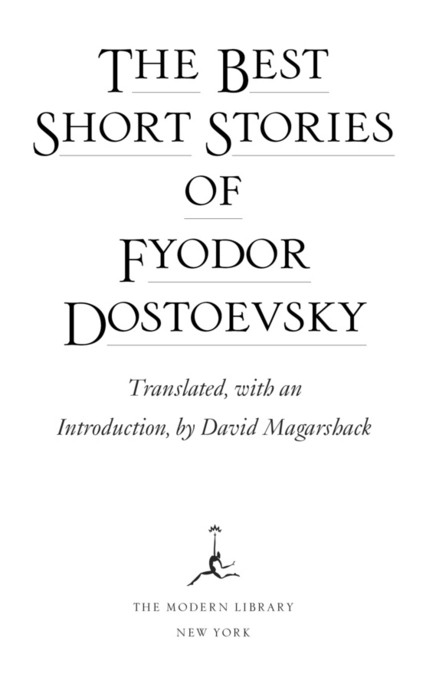The Best Short Stories of Fyodor Dostoevsky

2001 Modern Library Paperback Edition
Notes and Reading Group Guide copyright © 2001 by Random House, Inc. Biographical note copyright © 1992 by Random House, Inc.
All rights reserved under International and Pan-American Copyright Conventions. Published in the United States by Modern Library, an imprint of The Random House Publishing Group, a division of Random House, Inc., New York, and simultaneously in Canada by Random House of Canada Limited, Toronto.
The excerpt from “Dostoeffsky” from Master Builders, An Attempt at the Typology of the Spirit: The Three Masters: Balzac, Dickens, Dostoeffsky, vol. 1, by Stefan Zweig, was originally published in the German language by Williams Verlag AG, Switzerland, and in the English language by Viking Penguin, a division of Penguin Putnam, Inc.
Grateful acknowledgment is made to New Directions Publishing Corporation for permission to reprint an excerpt from Dostoevsky, by André Gide, translated by Arnold Bennett. Copyright © 1961 by New Directions. Reprinted by permission of New Directions Publishing Corporation.
MODERN LIBRARY and the TORCHBEARER Design are registered trademarks of Random House, Inc.
LIBRARY OF CONGRESS CATALOGING-IN-PUBLICATION DATA
Dostoevsky, Fyodor, 1821–1881.
[Short stories. English. Selections]
The best short stories of Fyodor Dostoevsky / translated, with a translator’s introduction by David Magarshack.
p. cm.
Contents: White nights—The honest thief—The Christmas tree and a wedding—The peasant Marey—Notes from the underground—A gentle creature—The dream of a ridiculous man.
eISBN: 978-0-307-82408-0
1. Dostoevsky, Fyodor, 1821–1881—Translations into English. 2. Russia—Social life and customs—Fiction. I. Magarshack, David. II. Title.
PG3326.A2 2001 00-048951
891.73’3—dc21
Modern Library website address: www.BookishMall.com
v3.1
CONTENTS
Cover
Title Page
Copyright
Introduction
WHITE NIGHTS
THE HONEST THIEF
THE CHRISTMAS TREE AND A WEDDING
THE PEASANT MAREY
NOTES FROM THE UNDERGROUND
A GENTLE CREATURE
THE DREAM OF A RIDICULOUS MAN
Commentary
Reading Group Guide
Biographical Note
INTRODUCTION
David Magarshack
With a writer of such great genius and such vast output as Fyodor Dostoevsky it is perhaps natural that criticism should be concerned mainly with his larger works. And yet it is in Dostoevsky’s smaller works that we find the highest expression of his creative power and profundity of thought. In these smaller works we find reflected as in a convex mirror the whole immensity of Dostoevsky’s world, concentrated with gem-like brilliance and startling clarity. Here and there in Dostoevsky’s great novels passages occur which reveal an inability to take a detached view of life and overcome political and racial prejudices, and it is in these works in particular that those “streaks of cruelty” appear that did not escape the notice of the Russian critics of his own day. In his smaller works, however, Dostoevsky was singularly free from partizanship. In the greatest of them, such as in Notes from the Underground and The Dream of a Ridiculous Man, Dostoevsky showed that he was capable of withdrawing from the conflict of human passions and of surveying the human scene with complete detachment. It is in these works, therefore, that the reader will obtain a clearer, if not deeper, insight into his genius and will be able to judge him more fairly than those who form their judgments about him mainly from his great novels.
The stories in this volume are (with one exception) published in their chronological order so as to afford the reader an idea of the growth of Dostoevsky’s genius through the different phases of its development. The exception is the short story, The Peasant Marey, which is placed after the three stories belonging to Dostoevsky’s first period, ending with his arrest and imprisonment in Siberia in 1849. As it deals with Dostoevsky’s life in prison, it forms a convenient connecting link between the young and the mature Dostoevsky.
Fyodor (Theodor) Dostoevsky was born in Moscow on October 30, 1821. His father was an army doctor, and Fyodor was the second of his six children. His childhood was spent in Moscow and on his father’s small estate in the Tula province. Already, as a child, Dostoevsky was distinguished by his highly excitable, “fiery” temperament, and from his early years he showed a great interest in literature. His father, however, decided that he should be an engineer, and accordingly in 1837, soon after the death of his mother, he and his elder brother Mikhail were sent to Petersburg to be placed in the Army Engineering College. Here Dostoevsky spent over five years, devoting most of his time, however, to reading and writing, having made up his mind to become a writer as soon as he could conveniently give up the career which had been forced upon him. An interesting light on Dostoevsky’s reading as a boy is shed in a letter he wrote to his brother on August 9, 1838. In that year he read through the whole of Shakespeare and Pascal, almost the whole of Balzac, Goethe’s Faust and his shorter poems, most of the works of Victor Hugo, and all the works (both in the original and translation) of the German romantic novelist Hoffmann. Curiously enough, his first literary efforts were two historical dramas, Mary Stuart and Boris Godunov, which he wrote in 1841, the extracts from which he read to his brother in the same year. These two plays have not been preserved. In 1841 Dostoevsky obtained his commission, and in 1842 he became a lieutenant.
1 comment